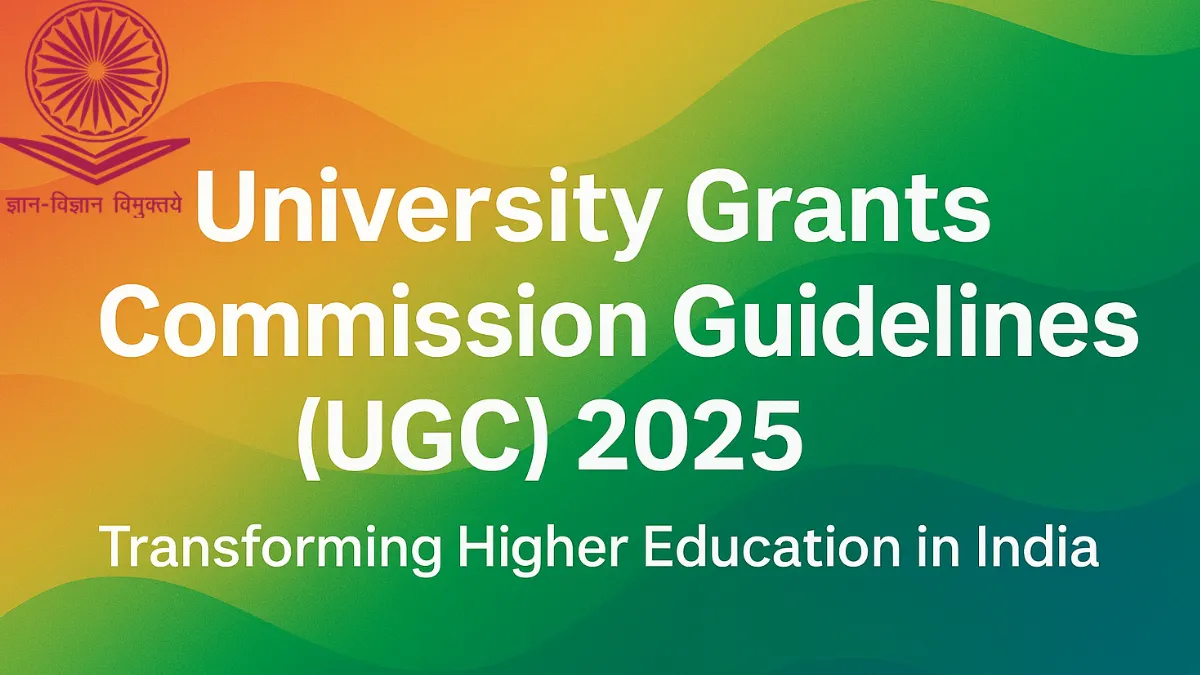University Grants Commission guidelines (UGC) have undergone a significant transformation in 2025, aligning India’s higher education system with global standards and future-ready approaches. These new guidelines aim to improve academic flexibility, student choice, industry alignment, and digital integration in colleges and universities across the country.
Let’s explore the key highlights of the 2025 University Grants Commission guidelines and how they impact students, institutions, and the overall educational landscape in India.
Major Highlights of the University Grants Commission guidelines 2025
- Four-Year Undergraduate Program (FYUP)
UGC has officially mandated the implementation of the Four-Year Undergraduate Program across all universities. Students can now opt for a 3-year general degree or a 4-year Honors degree with research, depending on their academic goals. - Multiple Entry and Exit System
One of the revolutionary changes in the 2025 guidelines is the formal adoption of the Multiple Entry and Exit System. Students can pause their education after one, two, or three years and rejoin later without losing credits.- 1 Year = Certificate
- 2 Years = Diploma
- 3 Years = Bachelor’s
- 4 Years = Honors/Research
- Academic Bank of Credits (ABC)
With ABC, students’ academic credits are stored digitally, allowing them to shift between institutions without losing progress. This is especially beneficial for working professionals and students who wish to pursue hybrid learning. - Emphasis on Multidisciplinary Education
UGC now promotes interdisciplinary studies. A student pursuing engineering can take courses in humanities or entrepreneurship, enabling a holistic and customizable learning experience. - Internship and Industry Engagement
To boost employability, institutions are required to integrate internships and industry-linked projects into the curriculum. Even in arts and humanities streams, skill-building modules and real-world experience are now emphasized. - Skill-based and Vocational Education
UGC guidelines push for skill-based education under the National Education Policy (NEP). Skill courses will now be part of the mainstream curriculum with credits that count towards degrees. - Internationalization of Education
Indian universities can now collaborate with foreign institutions for joint degree programs, twinning programs, and student exchange, with full UGC recognition. This opens global pathways for Indian students. - Digital Learning & Hybrid Classes
UGC recognizes and encourages the use of Massive Open Online Courses (MOOCs), SWAYAM platform, and hybrid models of teaching. Digital infrastructure and teacher training have been prioritized. - Assessment Reform
The guidelines introduce Continuous and Comprehensive Evaluation (CCE) with less weight on end-term exams. Internal assessment, peer review, and project-based grading are now more common. - Faculty Development
Universities must now ensure regular training, upskilling, and evaluation of faculty under UGC’s Faculty Development Programs. Research output and student engagement are also part of faculty KPIs.
Impact of University Grants Commission guidelines on Students
- Flexibility: Students have more control over their academic journey.
- Diversity: Can learn across subjects and even industries.
- Global Access: Opportunities for international exposure have widened.
- Career-Oriented: Skill-based learning and internships make graduates job-ready.
Challenges Ahead
- Implementation Gap: Not all universities are digitally or structurally ready.
- Faculty Training: Some institutions lag in preparing faculty for multidisciplinary or digital teaching.
- Rural Divide: Digital access remains a concern in Tier-3 towns and rural areas.
However, with policy backing and funding, these hurdles are expected to be addressed progressively.
Future of Higher Education in India
UGC’s new guidelines reflect a shift towards learner-centric, outcome-oriented, and future-ready education. By focusing on flexibility, global alignment, and practical skills, India is poised to become a hub for quality higher education in the 21st century.
FAQs
Q1. What is the biggest change in University Grants Commission guidelines 2025?
The introduction of the Four-Year Undergraduate Program and Multiple Entry/Exit system is the most significant reform.
Q2. Can I switch universities without losing my credits?
Yes, the Academic Bank of Credits allows you to transfer your academic progress across institutions.
Q3. Are internships mandatory now?
Yes, internships or industry projects are integrated into most degree programs for practical exposure.
Q4. Will online courses count towards my degree?
Yes, credits from SWAYAM and other approved MOOCs can be counted, as per UGC’s credit framework.
Q5. Are these guidelines applicable to private universities?
Yes, both public and private institutions recognized by UGC must comply.








